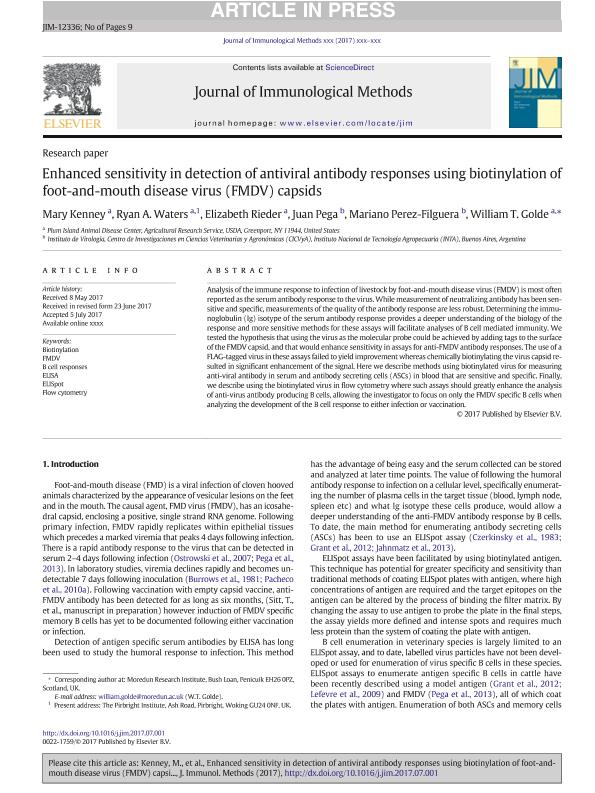Mostrar el registro sencillo del ítem
dc.contributor.author
Kenney, Mary
dc.contributor.author
Waters, Ryan A.
dc.contributor.author
Rieder, Elizabeth
dc.contributor.author
Pega, Juan Franco

dc.contributor.author
Pérez Filgueira, Daniel Mariano

dc.contributor.author
Golde, William T.

dc.date.available
2018-04-06T17:44:34Z
dc.date.issued
2017-07
dc.identifier.citation
Kenney, Mary; Waters, Ryan A.; Rieder, Elizabeth; Pega, Juan Franco; Pérez Filgueira, Daniel Mariano; et al.; Enhanced sensitivity in detection of antiviral antibody responses using biotinylation of foot-and-mouth disease virus (FMDV) capsids; Elsevier Science; Journal Of Immunological Methods; 450; 7-2017; 1-9
dc.identifier.issn
0022-1759
dc.identifier.uri
http://hdl.handle.net/11336/41173
dc.description.abstract
Analysis of the immune response to infection of livestock by foot-and-mouth disease virus (FMDV) is most often reported as the serum antibody response to the virus. While measurement of neutralizing antibody has been sensitive and specific, measurements of the quality of the antibody response are less robust. Determining the immunoglobulin (Ig) isotype of the serum antibody response provides a deeper understanding of the biology of the response and more sensitive methods for these assays will facilitate analyses of B cell mediated immunity. We tested the hypothesis that using the virus as the molecular probe could be achieved by adding tags to the surface of the FMDV capsid, and that would enhance sensitivity in assays for anti-FMDV antibody responses. The use of a FLAG-tagged virus in these assays failed to yield improvement whereas chemically biotinylating the virus capsid resulted in significant enhancement of the signal. Here we describe methods using biotinylated virus for measuring anti-viral antibody in serum and antibody secreting cells (ASCs) in blood that are sensitive and specific. Finally, we describe using the biotinylated virus in flow cytometry where such assays should greatly enhance the analysis of anti-virus antibody producing B cells, allowing the investigator to focus on only the FMDV specific B cells when analyzing the development of the B cell response to either infection or vaccination.
dc.format
application/pdf
dc.language.iso
eng
dc.publisher
Elsevier Science

dc.rights
info:eu-repo/semantics/openAccess
dc.rights.uri
https://creativecommons.org/licenses/by-nc-sa/2.5/ar/
dc.subject
B Cell Responses
dc.subject
Biotinylation
dc.subject
Elisa
dc.subject
Elispot
dc.subject
Flow Cytometry
dc.subject
Fmdv
dc.subject.classification
Otras Ciencias Veterinarias

dc.subject.classification
Ciencias Veterinarias

dc.subject.classification
CIENCIAS AGRÍCOLAS

dc.title
Enhanced sensitivity in detection of antiviral antibody responses using biotinylation of foot-and-mouth disease virus (FMDV) capsids
dc.type
info:eu-repo/semantics/article
dc.type
info:ar-repo/semantics/artículo
dc.type
info:eu-repo/semantics/publishedVersion
dc.date.updated
2018-04-06T14:09:15Z
dc.journal.volume
450
dc.journal.pagination
1-9
dc.journal.pais
Países Bajos

dc.journal.ciudad
Amsterdam
dc.description.fil
Fil: Kenney, Mary. Agricultural Research Service; Estados Unidos
dc.description.fil
Fil: Waters, Ryan A.. Agricultural Research Service; Estados Unidos
dc.description.fil
Fil: Rieder, Elizabeth. Agricultural Research Service; Estados Unidos
dc.description.fil
Fil: Pega, Juan Franco. Instituto Nacional de Tecnología Agropecuaria. Centro de Investigación en Ciencias Veterinarias y Agronómicas; Argentina
dc.description.fil
Fil: Pérez Filgueira, Daniel Mariano. Consejo Nacional de Investigaciones Científicas y Técnicas; Argentina. Instituto Nacional de Tecnología Agropecuaria. Centro de Investigación en Ciencias Veterinarias y Agronómicas; Argentina
dc.description.fil
Fil: Golde, William T.. Agricultural Research Service; Estados Unidos
dc.journal.title
Journal Of Immunological Methods

dc.relation.alternativeid
info:eu-repo/semantics/altIdentifier/doi/http://dx.doi.org/10.1016/j.jim.2017.07.001
dc.relation.alternativeid
info:eu-repo/semantics/altIdentifier/url/https://www.sciencedirect.com/science/article/pii/S0022175917302144
Archivos asociados
